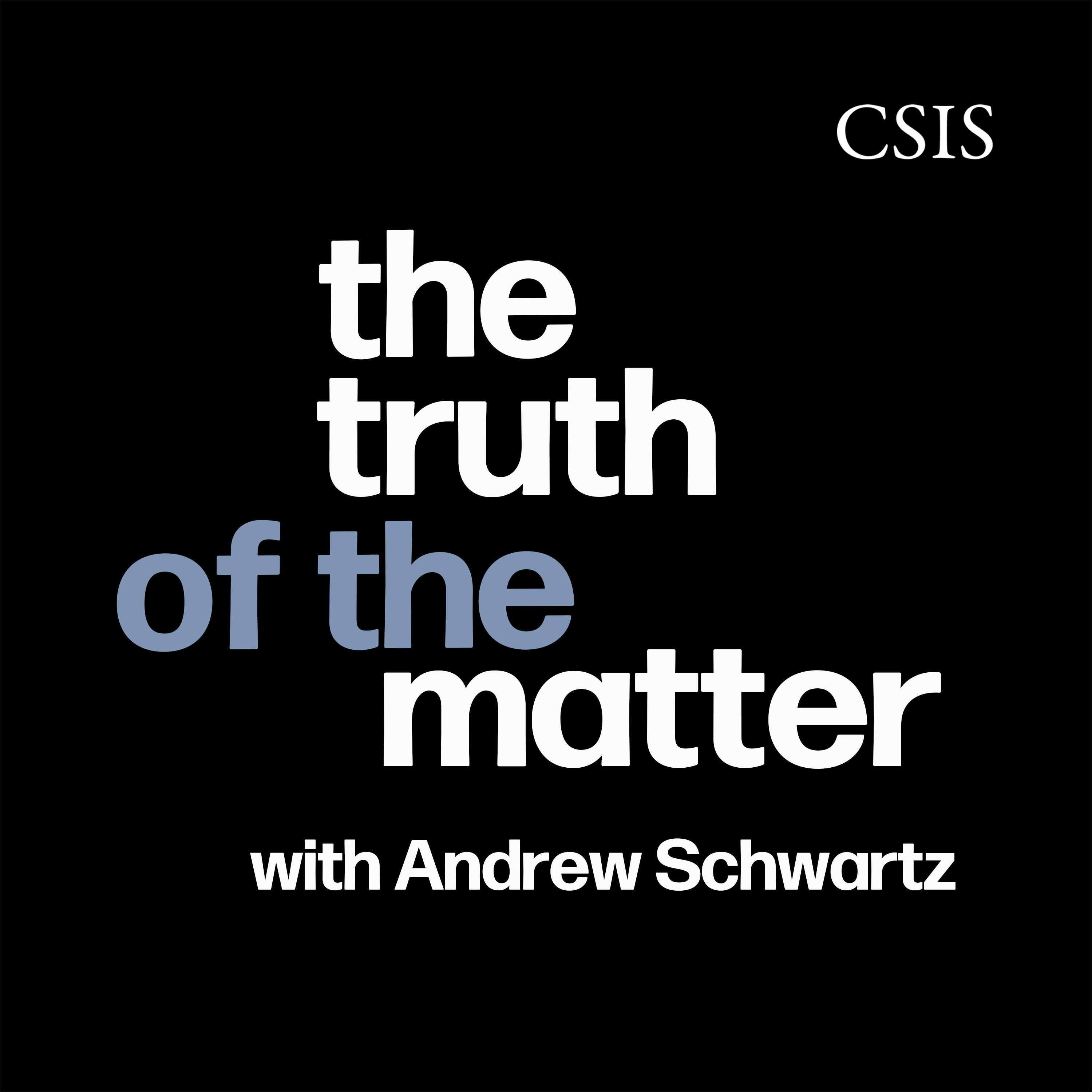

The Truth of the Matter
CSIS | Center for Strategic and International Studies
A weekly analysis of the complex policy issues driving the news.
Episodes
Mentioned books

Dec 13, 2021 • 42min
Dr. Ashish Jha on Omicron, Communication & What’s Next
In this crossover episode with the CSIS Coronavirus Crisis Update podcast, Brown University’s Dr. Ashish Jha provides his keen insights into the latest on Omicron as well as a reflection on 2021.

Dec 2, 2021 • 40min
CNN’s Chris Cilizza on Politics as Performance
CNN politics reporter and editor-at-large Chris Cillizza joins the podcast to talk about Rep. Lauren Boebert’s (R-CO) exchange with Rep. Ilhan Omar (D-MN) and how the politics of today have drifted further towards “performance.” Also discussed, President Biden’s approval ratings, midterm elections, Trump 2024, and more.

Dec 1, 2021 • 34min
Omicron Up Close in South Africa
Dr. Richard Lessells is among the exceptional South African experts on the front lines of discovering and investigating Omicron in South Africa. Alarm bells went off within the scientific community, as it became clear after just a few days that “an extraordinary number of mutations” are clustered in the key regions in the genome for immune protection and transmissibility. It was a “gut feeling. ” Omicron is highly transmissible, spreading very efficiently in a population with high levels of immunity gained from previous infection and in some cases from vaccination. How long to know just how dangerous Omicron is? It’s “too early to tell.” Lab work is underway to understand whether the virus affects T cells which are central to immune protection against severe disease. Why do we see such an unusual variant in South Africa? One theory, which Omicron may shed light on, is that the SARS-CoV-2 virus finds hosts who are very immune-compromised, persons living with HIV but not on anti-viral therapy. These individuals have difficulty clearing the virus, which permits it to replicate constantly over a very long period. Is this moment a pivot in the pandemic? That depends on whether Omicron significantly sets back vaccine protection, which would be a “step change.” Will this moment shock the world into more concerted global action, superseding the pattern of “vaccine apartheid”? “I remain skeptical.” In the meantime, we have to fight against Omicron being fitted to a politicized narrative: by anti-vaccine groups, to tell the story that vaccines do not work. By others, to argue that there is nothing to worry about, that the virus is becoming less pathogenic, based on anecdotal evidence. Dr. Richard Lessells is an infectious disease physician at the University of KwaZulu-Natal, in Durban, South Africa. He is a member of the Network for Genomic Surveillance in South Africa, and a researcher at CAPRISA, the Centre for the AIDS Programme of Research in South Africa.

Nov 16, 2021 • 38min
Cary Funk, Pew Research Center: “It Can Be Confusing”
In this crossover episode with the CSIS Coronavirus Crisis Update Podcast, we asked Cary Funk, Pew Research Center, to make sense of how the pandemic has impacted our society and American opinion as we approach the pandemic’s two years. “It can be confusing.” Polarization now increasingly aligns between the vaccinated versus the unvaccinated, versus simple partisan identity. At the fundamental level, Americans are split over whether Covid-19 is a common problem. Does the “Big Lie” bleed over into the field of public health? “It’s all complicated.” “The political lens” increasingly encompasses so much of public health, accelerating the erosion of public trust and confidence in science, a trend that had already been underway for years. False statements can travel the globe in 48 hours, but knowing the impact is much more difficult. Are we at a turning point, a softening of polarization? “We need to wait and see.” Heightened US international engagement enjoys majority support and has not become politicized. What is the impact of the loss of 757,000 lives on opinion? We have to continue looking at that. Cary Funk is director of science and society research at the Pew Research Center.

Oct 25, 2021 • 41min
Why We’re So Polarized
Johns Hopkins University professor Dr. Lillianna Mason joins the podcast for a discussion of political polarization in the U.S. and how politics have become central to the identities of many Americans across racial, religious and cultural lines.

Oct 18, 2021 • 29min
The Haitian Migrant Crisis and the Bigger Picture
CSIS’s Project on Fragility and Mobility Director Erol Yayboke and Human Rights Initiative Director Marti Flacks join the podcast to discuss the Haitian migrant crisis as a microcosm of how climate change, human rights, and national security are increasingly intertwined.

Oct 14, 2021 • 28min
Dr. Leana Wen on Covid and Her New Book “Lifelines”
In this crossover episode with the CSIS Coronavirus Crisis Update Podcast, Dr. Leana Wen, Washington Post columnist and CNN analyst joined CSIS’s J. Stephen Morrison and Andrew Schwartz to discuss the current state of Covid in the United States plus her new book, “Lifelines: A Doctor’s Journey in the Fight for Public Health.”

Sep 30, 2021 • 29min
German Elections and Future of Euro Leadership
CSIS’s Europe and Eurasia Program director Heather Conley joins the podcast to discuss the German elections and what they mean for Germany and greater Europe’s future as well as its relationship with the United States.

Sep 24, 2021 • 32min
Social Media and Political Polarization
Professor Paul Barrett, deputy director of the New York University Stern Center for Business and Human Rights joins the podcast to discuss his new report, “Fueling the Fire: How Social Media Intensifies U.S. Political Polarization—And What Can Be Done About It.”

Sep 23, 2021 • 26min
Sub Deal with Aus-UK
CSIS’s Dr. Mike Green joins the podcast to discuss the geopolitical implications of the AUKUS nuclear submarine deal and the fallout with France.


